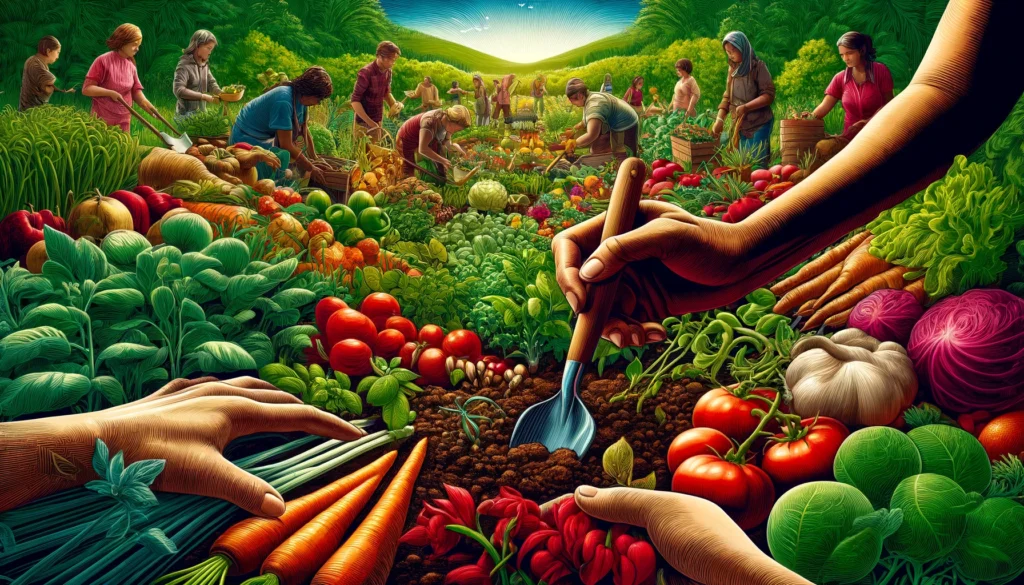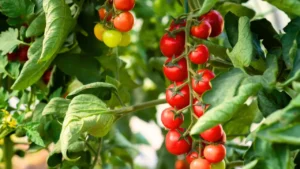
Agriculture Dictionary A vivid detailed close up illustration of food sovereignty. The scene focuses on hands of diverse individuals working together in a community garden1.webp.webp
Definition: Food Sovereignty
Food sovereignty is the right of people to define their own food systems, including the production, distribution, and consumption of food. It emphasizes local control over agricultural policies, sustainable farming practices, and the empowerment of local communities to ensure food security, cultural appropriateness, and environmental sustainability.
Understanding Food Sovereignty
Introduction
Food sovereignty goes beyond food security by focusing on the rights of people and communities to make decisions about their food systems. It promotes sustainable agriculture, local food production, and the empowerment of farmers and consumers. This concept challenges the industrial food system, advocating for policies and practices that prioritize local needs, ecological health, and social justice.
Fall off the barn roof and busted your keister? Life on the farm or ranch can be tough on the bum. Need a break? Laugh it off at FarmerCowboy.com, the #1 farm humor site. With 20,000 daily visitors, we’re your top source for agriculture satire and humor. Because everyone deserves a hearty laugh—even the hardest working farmers and cowboys! Join us and turn those long days into fun tales at FarmerCowboy.com.
Key Principles of Food Sovereignty
1. Local Control
Food sovereignty emphasizes local control over food systems, allowing communities to define their own agricultural policies and practices. This includes prioritizing local food production, supporting small-scale farmers, and reducing dependence on global markets.
2. Sustainable Practices
Sustainable farming practices are central to food sovereignty. This involves protecting natural resources, preserving biodiversity, and promoting agroecology, organic farming, and other environmentally friendly methods.
3. Cultural Appropriateness
Food sovereignty respects and promotes traditional knowledge, cultural practices, and food preferences. It ensures that food systems are culturally appropriate and sensitive to the dietary needs and preferences of local communities.
4. Social Equity
Ensuring social equity is a fundamental aspect of food sovereignty. This includes fair wages and working conditions for agricultural workers, equitable access to land and resources, and the protection of farmers’ rights.
5. Economic Viability
Food sovereignty supports the economic viability of local food systems by ensuring fair prices for farmers, reducing food miles, and promoting local markets. This helps build resilient local economies and reduces vulnerability to global market fluctuations.
6. Community Empowerment
Empowering communities to take control of their food systems is essential for food sovereignty. This involves participatory decision-making, grassroots organizing, and building local capacity to manage food production and distribution.
Benefits of Food Sovereignty
Empowerment of Farmers and Communities
Food sovereignty empowers farmers and local communities to take control of their food systems. This leads to increased self-reliance, stronger community ties, and greater resilience against external shocks.
Environmental Sustainability
By promoting sustainable farming practices, food sovereignty helps protect natural resources, preserve biodiversity, and mitigate climate change impacts. This contributes to healthier ecosystems and more sustainable food production.
Food Security and Nutrition
Local control over food systems ensures that communities have access to adequate, nutritious, and culturally appropriate food. This improves food security and enhances overall health and well-being.
Cultural Preservation
Food sovereignty respects and promotes traditional food practices and knowledge. This helps preserve cultural heritage, supports biodiversity, and fosters a deeper connection between people and their food.
Economic Resilience
Supporting local food systems and reducing dependence on global markets builds economic resilience. This ensures that farmers receive fair prices, local economies thrive, and communities are less vulnerable to global market fluctuations.
Challenges of Food Sovereignty
Policy and Regulatory Barriers
Existing policies and regulations often favor industrial agriculture and global trade, posing challenges for food sovereignty initiatives. Advocating for supportive policies and overcoming regulatory barriers is essential.
Market Access
Small-scale farmers and local food producers may struggle to access markets that value and reward sustainable practices. Building consumer awareness and demand for locally produced food is crucial.
Resource Limitations
Implementing food sovereignty requires access to land, water, seeds, and other resources. Ensuring equitable access to these resources is a significant challenge.
Globalization and Trade Pressures
Globalization and trade agreements can undermine local food systems by promoting the import of cheap, subsidized food. Protecting local markets from unfair competition is a key aspect of food sovereignty.
Steps to Achieving Food Sovereignty
1. Advocate for Supportive Policies
Engage in policy advocacy to promote laws and regulations that support food sovereignty. This includes land reform, fair trade policies, and subsidies for sustainable farming practices.
2. Build Local Food Systems
Strengthen local food systems by supporting farmer’s markets, CSAs, and local food networks. Encourage consumers to buy locally and seasonally, reducing food miles and supporting local farmers.
3. Promote Sustainable Practices
Encourage the adoption of sustainable agricultural practices through education, training, and financial incentives. Support farmers in transitioning to organic, regenerative, and agroecological methods.
4. Foster Community Empowerment
Empower communities to take control of their food systems through participatory decision-making, grassroots organizing, and capacity-building initiatives. Involve local stakeholders in planning and implementing food sovereignty initiatives.
5. Raise Awareness
Educate consumers about the benefits of food sovereignty and encourage mindful consumption. Awareness campaigns can highlight the environmental, economic, and social impacts of food choices.
Case Studies of Food Sovereignty Initiatives
1. La Via Campesina (Global)
La Via Campesina is an international movement that advocates for the rights of small-scale farmers and promotes food sovereignty. They work globally to influence agricultural policies, protect farmers’ rights, and promote sustainable farming practices.
2. Navdanya (India)
Founded by Dr. Vandana Shiva, Navdanya promotes biodiversity and food sovereignty by supporting smallholder farmers and preserving traditional knowledge. They work to create seed banks, promote organic farming, and advocate for farmers’ rights.
3. MST (Movimento dos Trabalhadores Rurais Sem Terra) (Brazil)
The MST is a landless workers’ movement in Brazil that fights for land reform and food sovereignty. They have successfully resettled thousands of families on unused land, promoting sustainable agriculture and community empowerment.
Conclusion
Food sovereignty is a transformative approach to food systems that prioritizes local control, sustainability, and social equity. By empowering farmers and communities to define their own food systems, food sovereignty promotes environmental sustainability, economic resilience, and cultural preservation. Despite challenges such as policy barriers and resource limitations, the principles of food sovereignty offer a pathway to more just and sustainable food systems.
How Knowledge of Food Sovereignty Can Help Farmers
Understanding food sovereignty can help farmers advocate for their rights, adopt sustainable practices, and build resilient local food systems. By aligning their practices with the principles of food sovereignty, farmers can enhance their economic viability, protect natural resources, and contribute to community well-being. This knowledge empowers farmers to innovate, collaborate, and thrive in an increasingly globalized food system.

Originally posted 2024-05-26 03:37:04.
Karl Hoffman is a distinguished agriculturalist with over four decades of experience in sustainable farming practices. He holds a Ph.D. in Agronomy from Cornell University and has made significant contributions as a professor at Iowa State University. Hoffman’s groundbreaking research on integrated pest management and soil health has revolutionized modern agriculture. As a respected farm journalist, his column “Field Notes with Karl Hoffman” and his blog “The Modern Farmer” provide insightful, practical advice to a global audience. Hoffman’s work with the USDA and the United Nations FAO has enhanced food security worldwide. His awards include the USDA’s Distinguished Service Award and the World Food Prize, reflecting his profound impact on agriculture and sustainability.






